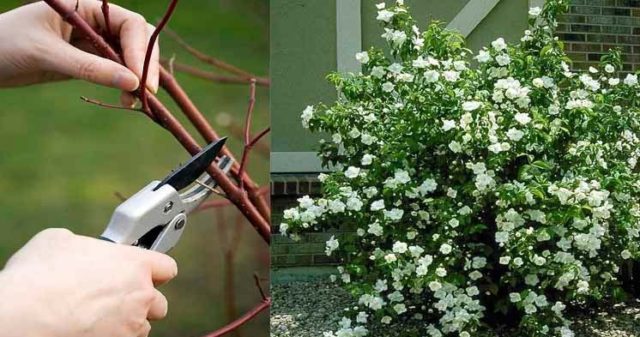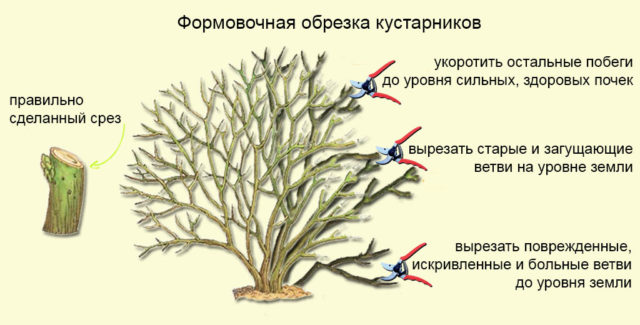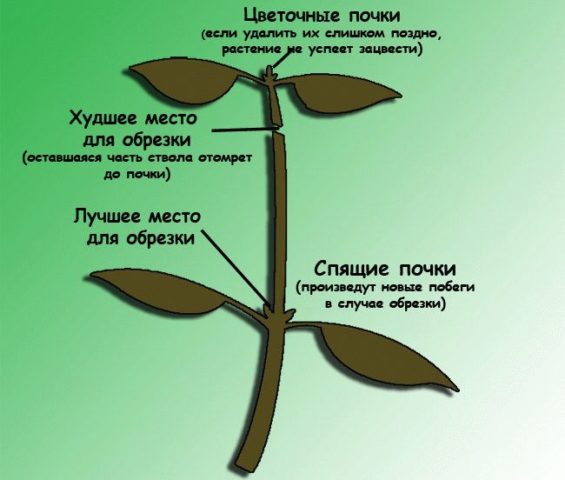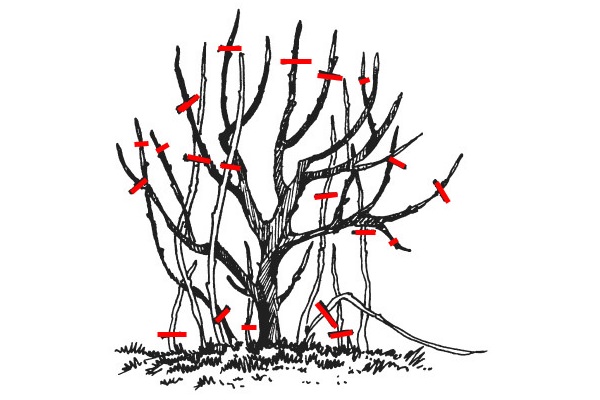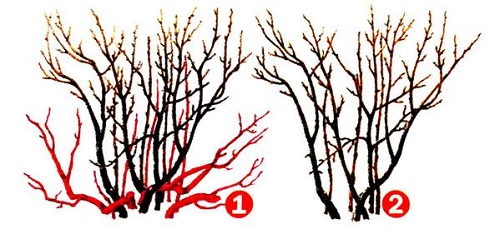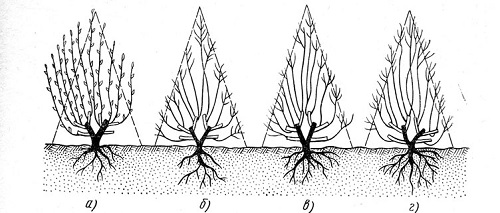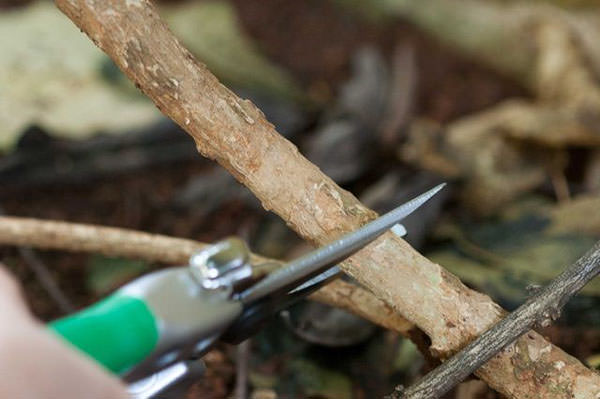Content
Garden jasmine, or chubushnik, is one of the most unpretentious ornamental plants popular with landscape designers. It does not require any special care, adapts to any growing conditions, annually delighting with stunning flowering and delicious aroma. Pruning a mock-orange in the spring is a mandatory procedure, thanks to which you can form a neat, lush bush shape with an abundance of attractive, fragrant flowers.
Do I need to cut a mock-orange in spring
Despite its attractiveness, without pruning, the mock-orange turns into an unsightly shrub or ordinary thickened thickets. Therefore, the main purpose of spring cutting is to give the plant a neat shape with a beautiful placement of trunks and numerous peduncles, without the presence of old, dried branches.
Sanitary pruning is performed before bud break and active sap flow begins at the very beginning of the appearance of the first leaves. At this time, frozen at the ends and dry twigs are clearly visible. Remove old, dry and frozen branches. However, spring pruning is not limited to sanitary pruning. The formation of garden jasmine is performed at the same time as sanitary pruning, which means removing too long, protruding branches. Strong, developed shoots are shortened slightly, and weak, thin ones are removed by more than half the length. After such a haircut, annual shoots enter into active growth, forming a lush bush of a neat shape. First of all, it is necessary for a hedge. But individual garden compositions with jasmine are worth paying attention to.
Pruning a mock-orange in the spring is a must, and a visual video for novice gardeners will demonstrate all the nuances of this event:
The goals and objectives of the spring pruning of the mock-orange
Spring pruning of ornamental garden jasmine is necessary for a number of reasons:
- to stimulate growth and active development of young growth, which will be the basis of flowering in subsequent years;
- buds on old branches are poorly formed, especially in their upper part, which reduces the number of flowers;
- abundant flowering of the mock-orange is impossible in thickened growth with a small amount of penetrating light;
- with dense thickets, the bush spends nutrition and strength on the development of the shoot, while flowering becomes scarce and rare;
- mock orange by nature is not a symmetrical plant and without pruning the shoots grows unevenly, which makes it one-sided;
- cutting allows you to shorten the height of the plant, which can naturally grow up to 2.5 meters or more;
- pruning makes it possible to form a shrub with the desired shape and neat appearance, therefore, the mock-orange is widely used to create various landscape design compositions.
Types of pruning chubushnik
There are several types of chubushnik haircuts:
- formative - for bushes over 5 years old, gives it the desired shape, increases the number of flowers and their size, makes it symmetrical and the same on all sides;
- sanitary or revitalizing - with pruning of dry, damaged branches, eliminates the possibility of the development of fungi and pests;
- after flowering - is intended to give a neat chubushnik and an evenly growing, attractive crown;
- rejuvenating - stimulates the growth of young shoots after damage or on old plants, promotes lush and abundant flowering.
How to cut a mock orange in spring
It will not be difficult to correctly and competently cut the mock-orange in early spring if you know some of the features of the agrotechnical technique. First, they begin to remove the frozen shoots broken from snow and wind. Without urgent need, they are not completely shortened, but cut to a living kidney. A haircut will give a lateral growth of young branches, on which flowers will appear in a year. In regions with harsh winters, the thinning of the chubushnik is also timed to spring. After sanitary pruning, the shrub is carefully examined and shoots sticking out, growing inward or sideways are removed. In addition, deformed, weak and very closely spaced branches are removed. In the spring, do not touch the tops of the shoots with flower buds. Pruning a chubushnik in the summer, after flowering, will allow you to enjoy the picturesque picture of a flowering bush, and then shorten it in height.
When to cut a mock-orange
The first time pruning is carried out immediately after planting garden jasmine, it does not matter if it was done in autumn or in spring. To do this, remove improperly growing, unsightly shoots, immediately indicating their shape. No more than three trunks with developed buds are left, which will provide them with freedom for active growth. In the open space, the remaining branches will develop rapidly and will be rewarded with abundant flowering next year.
Sanitary pruning of the chubushnik is performed in early spring, from about mid-March, depending on the region and climatic conditions. Forming - in spring or summer, immediately after flowering, which depends on the climate and the variety of garden jasmine. In the first three years, the plant does not need shaping pruning. Experienced gardeners prune only protruding, unsightly branches, simply shortening them slightly, which determines the shape of the chubushnik.
Preparation of tools and materials
A sharp, high-quality pruner is an ideal tool for shaping and trimming a mock-orange. It must be absolutely clean. Do not cut with a blunt tool that will damage the processes. You will also need a garden var, which is used to treat all sections, protecting fresh wounds of jasmine from hordes of harmful microorganisms.
Schemes for trimming a mock-orange in spring
Sanitary haircut, in which, in addition to weak and damaged processes, branches infected with diseases are removed:
Pruning a mock orange after flowering looks like this in the diagram:
How to cut a chubushnik
There are certain rules for cutting a chubushnik:
- shoots forming at the base of the shrub are completely removed, since they impair the decorative qualities;
- when pruning a young chubushnik, the upper part of the branches less than two years old is not removed - a crown will form later from them;
- strong, strong shoots should not be cut short, and thin ones should not be left long;
- the roots that appear in the near-stem circle are immediately removed;
- for uniform illumination of the crown, the height of the chubushnik is left 1.5 or, at most, 2 m.
Branching is done at an angle of 45 degrees.
How to prune a mock orange after flowering
In the summer, after the end of flowering, formative pruning is carried out with the removal of too long shoots, small, up to 5 cm, twigs and wilted flowers. Thinning is performed, leaving only young shoots.At the old mock-orange, four- to five-year branches are cut off, but if the plant is too old, they carry out its full rejuvenating pruning to the base. However, in order for the chubushnik to please with its decorativeness and neatness of the crown, they are engaged in its formation throughout the season.
How can you form a chubushnik
The formation of the crown, if necessary, is carried out throughout the summer cottage if:
- the bush is stretched out in height;
- grows asymmetrically;
- very thickened.
All of the above phenomena have a negative effect on the development of the chubushnik, therefore it is necessary to form it:
- to reduce the number of fast-growing shoots by 2 times, which allows the lateral shoots to grow actively;
- complete removal of old branches and those that grow inward, which reduces the density of the shrub;
- trimming large, elongated shoots to give the jasmine a regular, symmetrical shape.
Gardeners who do not have sufficient experience in growing ornamental plants are initially able to make it neat and symmetrical. With the advent of experience, you can form a bush in the form of a ball, cube, cone or other geometric shape. To do this, the chubushnik is regularly cut in the spring or, less often, in the fall in this way:
- a young seedling is cut very low, to the base;
- the next year, they examine the new growth and leave a few of the strongest, located harmoniously, and the rest are cut out;
- after flowering, the branches are cut off to the young growths located below, the chubushnik will bloom on the lateral, short shoots;
- regularly carry out sanitary pruning with the removal of old, weak and thickened shoots;
- make sure that the bush retains its shape, for example, of a ball, cutting off protruding branches.
You can watch the video about the correct formation of the crown when trimming the mock-orange:
Caring for shrubs after cutting
After pruning, garden jasmine needs care, which is as follows:
- feeding with phosphorus-potassium fertilizers every 10 days - after the spring haircut, with simultaneous abundant watering;
- mineral dressing 1 - 2 times can be replaced with organic diluted slurry with water in a ratio of 1:10, add no earlier than 10 - 12 days after pruning;
- mulching the soil of the near-trunk circle with peat, fallen leaves, sawdust.
Conclusion
At first glance, pruning a chubushnik seems like a complicated procedure. However, having gained experience, even novice gardeners can easily cope with this obligatory agrotechnical technique, thanks to which the garden jasmine takes on a beautiful shape and pleases with delightful flowering.
